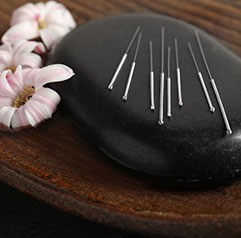Acupuncture
What is it?
Acupuncture is the most well known part of Traditional Chinese Medicine (TCM), which has been used for over 2,500 years all over the world. Acupuncture is the insertion of very thin needles into acupoints all over the body to stimulate, move, and harmonize qi, the energy of the body. When the qi, or your body’s energy, is not able to move freely or is moving in the wrong direction, you can develop a wide range of symptoms depending on what part of your body is being affected. By returning balance and appropriate movement to the body’s qi, acupuncture can provide relief and correct a gamut of health problems.
Each acupoint has specific indications and functions, which licensed acupuncturists have spent years studying in order to provide individualized treatment to each and every patient. Over 400 common acupuncture points are memorized in the first year of study, although TCM holds that there are over 2,000 acupoints all over the body! Most of these points are connected via channels or meridians. There are 12 primary channels and 8 extraordinary channels all over the body. The 12 primary channels are all related to the various internal organs of the body, which is how needles inserted into the superficial and muscle layers of the body can treat internal conditions, such as asthma and nausea. Western medicine practitioners have begun finding over the past several years that many health conditions, especially musculoskeletal complaints, often express through these channels with the acupoints being more sensitive to touch than other parts of the body.
Because acupuncture affects the body’s qi or energy, many people find that it can help with emotional conditions as well, like anxiety or depression. If you or anyone you know has ever suffered from depression, you likely felt “stuck” – physically stuck in bed, stuck at work like you cannot move forward, or stuck in life like you cannot continue to grow. This feeling of “stuckness” can occur when your qi becomes blocked and cannot flow freely in your body; therefore, by getting your qi harmonized and moving properly again can help alleviate your depression. So when people ask, “what can acupuncture help?” you can now understand why it can help just about anything!
Furthermore, two people with the same disease may have a completely different set of acupuncture points or additional techniques used in treatment. This is because in Chinese medicine, there is a saying:
Tong bing yi zhi. Yi bing tong zhi.
Different diseases, one treatment. Same disease, different treatments.
This concept is why your acupuncturist must perform a complete evaluation prior to starting treatment – she must make sure that she matches the treatment to the pattern/cause of your symptom(s). One person may have symptoms because of a deficiency of qi, so the treatment for this person would be to strengthen and build qi. On the other hand, someone else may have the same symptoms but they are due to qi being stuck and unable to move freely, so their treatment would be to strongly move the qi to break the blockages and restore its proper flow.
If the practitioner accidentally switched the treatments, the person with weak qi would have their energy strongly moved, which would make their qi weaker and he would feel exhausted after treatment. The person with the blockages who underwent a strengthening treatment would also feel worse because his qi blockages would be made bigger! As you can see, it is crucial to provide the right treatment and why acupuncture is not a “one size fits all” system of medicine that takes years of study and training to master. It is also why you should consider a licensed acupuncturist rather than a certified one. A licensed acupuncturist has obtained her postgraduate degree in acupuncture (120 credits) or acupuncture and Oriental medicine (164 credits), passed the National Certification Commission for Acupuncture and Oriental Medicine (NCCAOM) Boards, and fulfilled all state licensure requirements. Certified acupuncturists have not undergone this same process, and most do not have a postgraduate degree in acupuncture or Oriental medicine.



